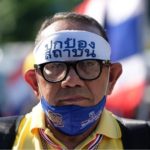
The Royal Thai Police have summoned the leaders of the anti-government protesters to face charges of lèse majesté, stemming from comments made that called for institutional reforms to Thailand’s monarchy. Three of the leaders include student leaders Parit “Penguin” Chiwarak and Panusaya Sithijirawattanakul, as well as human rights lawyer Arnon Nampa, who began discussing monarchical reforms as early as August. The summons comes after a planned protest outside the Crown Property Bureau.
Convictions can bring sentences as long as 15 years in prison. While lèse majesté, or Article 112, has not been used since 2017, its reactivation sends a signal that both the military and the monarchy are now willing to risk reputational damage in order to protect their interests and a dangerous escalation in the use of political weapons to suppress regime critics.

In the recent past, Thai Prime Minister Prayut Chan-o-cha has stated that the decline in the use of Article 112 was a request of King Vajiralongkorn himself, because “the king has mercy and advised us not to exercise the law.”
Further, the Thai monarch has instructed the junta leader to refrain from using the law as a political weapon. This was supposedly after Sulak Sivaraksa, a social critic and Buddhist scholar had a private audience with Vajiralongkorn, and suggested that lèse majesté was injurious to the image of the monarchy.
The late King Bhumibol Adulyadej noted back in 2005 that the government should stop invoking Article 112 as it, like Sulak suggested, damages its reputation. In his birthday speech, King Bhumibol said, “Actually, I must also be criticized. I am not afraid if the criticism concerns what I do wrong, because then I know. Because if you say the king cannot be criticized, it means that the king is not human. If the king can do no wrong, it is akin to looking down upon him because the king is not being treated as a human being. But the king can do wrong.”
A Brief History
Lèse majesté has been around since 1908, but its usage has accelerated dramatically since 2006. After Thaksin Shinawatra’s removal, more than 700 cases have been filed by the Thai police—increasing to more than 250 under the unelected military junta. More than 90 people have been prosecuted under the law, and 43 people have been sentenced. Like many other punitive and draconian laws, Article 112 is often used as a tool to silence regime critics or intimidate political opponents.
During the mourning period after the death of Bhumibol, the country experienced a surge in lèse majesté case filings, with bands of royalists accusing several people of insulting the late monarch, but police dismissed several due to a lack of evidence. Under the junta, many of the more serious Article 112 cases were held in private and under military courts. The most chilling examples came in January 2019, when two exiled critics of both the military and the monarchy, Chatcharn Buppawan, and Kraidej Luelertwere were found dead along the Mekong River on the border with Lao PDR. Further, Surachai Danwattananusorn, who operated a radio station that was often critical of the government disappeared in December 2018.
Despite the two-year Article 112 hiatus, the military-backed regime has had plenty of other political weapons at its disposal, including the Computer Crime Act, which gives broad powers to Thailand’s cybersecurity agencies, and charges of sedition, which have been used more than 100 times since 2014. Because of provisions in the Computer Crime Act, human rights activists, opposition politicians, and individual social media users have been punished for sharing information that has been deemed a threat to national security or public safety, which was the case for then-popular opposition party leader Thanathorn Juangroongruangkit. Parit was arrested on charges of sedition this past August, which carries a maximum seven-year sentence.
Among the most famous recent lèse majesté cases was that of Jatupat Boonpattararaksa, a prominent pro-democracy activist. He was arrested and found guilty of Article 112 in 2016 for sharing a BBC article featuring Vajiralongkorn. He was “pardoned” along with 50,000 others prior to the coronation in 2019.
Censorship and repression have always existed in Thailand—and the unrestricted use of lèse majesté only adds to the arsenal at the disposal of the regime. Now that the usage of Article 112 has returned, and seemingly has the backing of the monarchy, it is likely Thailand will not only see a revival of its usage by the regime but by royalists who will inevitably try to use the law to punish dissenters.
The revival of lèse majesté means more citizen-on-citizen forms of retaliation, as well as the political variety. Lèse majesté can be brought by any Thai citizen against anyone—foreign or Thai. The regime has nurtured this culture of discrimination and repression, with the most significant escalation prior to 2014 under the tenure of Abhisit Vejjajiva, who erected huge billboards calling on Thais to “protect the monarchy” by reporting individuals who defamed it. Thailand will soon revert to the normalized political climate where lèse majesté is a political blood sport. Relevant cases include that of Suda Rangkupan, the former Chulalongkorn University lecturer who wore black during the month of December.
Now that Article 112 is back on the table, it can once again be used with its clever and dangerous timing. The royal succession of power has been completed, but political uncertainty is growing. Lèse majesté is a reminder to protesters that their growing status and prominence in Thai political culture will not be tolerated by the status quo. As the protests increase, so too will its usage. Thailand’s national blood sport has returned.






